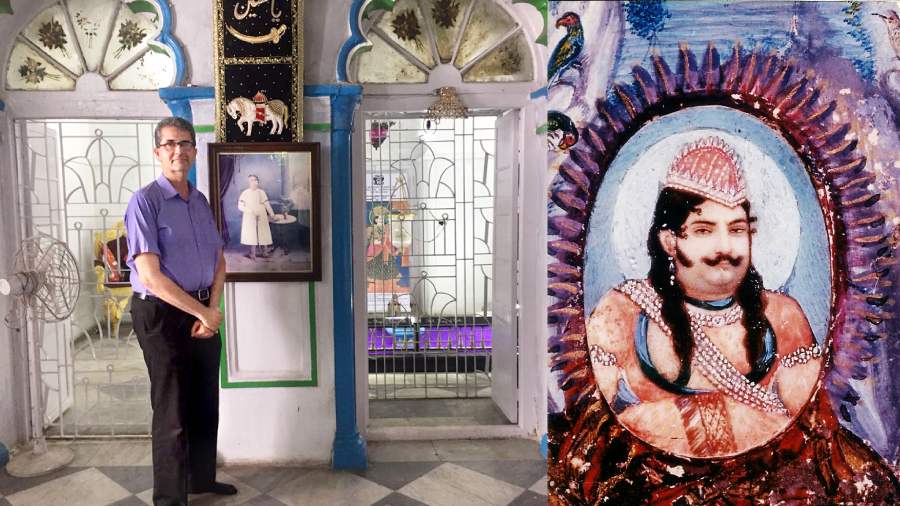Shahanshah Mirza, the great great grandson of King Wajid Ali Shah, is a senior officer with the Union ministry of finance in Kolkata. As a heritage enthusiast, he wrote this article to mark Shah’s 200th birth anniversary on July 30, 2022.
After Awadh was annexed shamelessly in 1856 by the English East India Company on a false charge of maladministration, its last king Wajid Ali Shah decided to come to Kolkata with his mother Malikah Kishwar and son and heir-apparent Prince Hamid Ali, to place his case before the governor-general as he had heard a lot about the British sense of justice.
He was optimistic that he would be able to convince him that the annexation of his kingdom was wrong and improper and get back to Awadh.
While the negotiations were going on in London, the First War of Independence broke out in 1857 and the paranoid English placed Shah under (nazarbandh) house arrest in Amherst House inside Fort William for 26 months.
After his release, Shah decided to live in Kolkata and chose Metiaburj as the burbling Hooghly river reminded him of the Gomti in Lucknow and gave some solace to his broken heart.
Hearing this, thousands of his loyal subjects flocked to Kolkata. His talent and artistic bent of mind helped him successfully create a quaint city within a short time, which transformed into mini-Lucknow, replete with the trappings of royalty and nobility.
Shah lived here for 31 years and left an indelible mark on this metropolis, which is still vibrant and strong.
The formal entry of Urdu in Kolkata began with the establishment of the Calcutta Madarsa in 1781 by Warren Hastings and later developed because of institutions like the Asiatic Society and Fort William College.
However, Urdu flourished and grew exponentially when thousands of citizens of Awadh flocked to Metiaburj. The settlers spoke chaste Urdu and its sweetness spread quickly. Shah passionately promoted and patronised this language by encouraging writers and poets. Events like mushairas (poetic symposiums), ghazals, marsiaya (the tragedy of Karbala recited in the lyrical form), and qawalis became very popular.
The patronage gave rise to a new generation of talented poets, writers, singers, and narrators elevating Kolkata as an important centre of Urdu, which it continues to be till today.
Awadhi’s cultural loss added glory to this city’s cultural efflorescence. The king in the true regal style held regular Kathak dance programmes in his parikhana or the abode of his young dancers as he was their biggest benefactor.
Talented local artists like Raja Sourindra Mohan Tagore and Pandit Jadu Bhatta benefitted from this musical atmosphere. The spirit of Lucknow was introduced in Metiaburj with full enthusiasm and made many accomplished singers, instrument players, lyricists and dancers congregate in Kolkata from Lucknow, Varanasi, Allahabad, Kanpur, Agra and other places.
The babus of Bengal, impressed by this, built their jalsaghar (dancing halls) where such programmes were regularly held. As the rich Bengalis started extending their patronage to artistes, the spin-off was the growth of hundreds of kothas of baijis across the city and the popularity of classical dance.
In those days, contrary to popular belief, kothas had nothing to do with the flesh trade. It was strictly a discipline of fine art. Kolkata emerged as the new cultural capital, attracting talents and patrons from all over.
In later years, as the Hindi film industry blossomed, many artistes from Bengal played an important role as song, dance and music became an integral part of our films.
The pastime of kite flying was introduced by Shah in Kolkata, where it caught the imagination of the rajas, maharajas and zamindars of 19th-century Bengal and became their favourite hobby.
Although this sport has few takers now, still there are many units active in Metiaburj producing thousands of kites which are supplied all over India. A large number of women operating from their houses are involved in this trade.
Other pastimes like cock-fighting and flying pigeon (kabootar baazi) also became extremely popular. A lot of time, money and energy was spent on rearing and training pigeons. Some indulged in cross-breeding pigeons to produce champions. Even now, in many homes, men take an active interest in this sport. Like kite flying, the sport of flying pigeons is fading but there is still a small band of enthusiasts who indulge in this ancient and fascinating hobby.
The rulers and nobilities of Awadh were fashion-conscious and Shah brought with him the fine art of Lucknawi tailoring. To cater to their demand, many tailors from Awadh settled close to Metiaburj. They excelled in stitching achkhan, sherwani, churidar, kurta-pyjama, shahrara, gharara, and shalwar-kameez. One generation handed over the skills to the next and gradually a huge army of tailors emerged.
There are hundreds of shops selling clothing materials and other accessories making it one of the biggest manufacturing centres for unbranded garments in Asia generating revenue of Rs15,000 crore annually. The dresses manufactured here are sold in leading boutiques of the country besides being exported. If there is one thing the people of this state remember and love Shah the most foris the introduction of delectable Awadhi cuisine in generaland biryani in particular.
Some of the talented chefs who accompanied him prepared dishes like pulao, korma, kebabs, biryani, zarda, roghni roti, sheermal and shahi tukra. His chefs introduced the traditional Awadhi style of cooking, known as Dum Pukht, in Kolkata. This created a food revolution that is getting stronger by the day.
Wajid Ali Shah is more popular and loved in Kolkata than in Lucknow. Even 135 years after Shah’s death, his name is taken with a lot of reverence, pride and affection in Bengal.
Kolkata Municipal Corporation renamed the main arterial road in Metiaburj after him in the early-2000s and now plans to set up a hospital in his memory.
History will always remember that Kolkata gave refuge to an unlucky ruler and in return got a taste of diverse culture, which elevated the lifeblood of this vibrant society.
